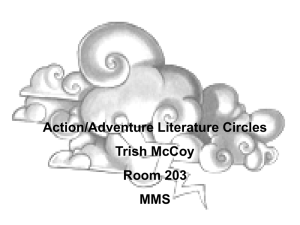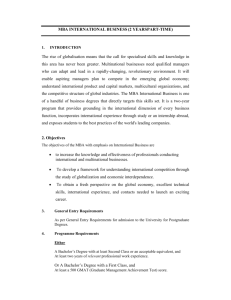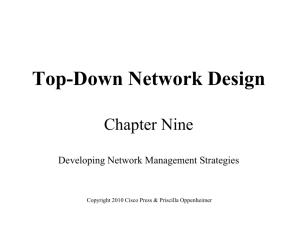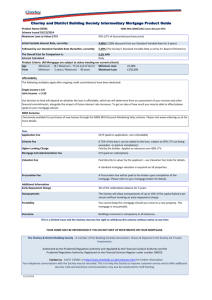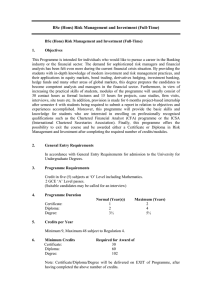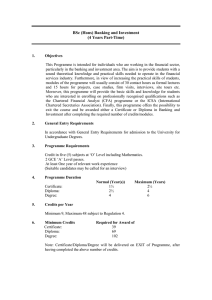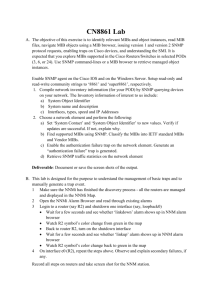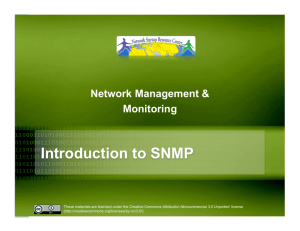Bachelor in Business Management (BBM (Hons) (4 Years Part-Time)
advertisement
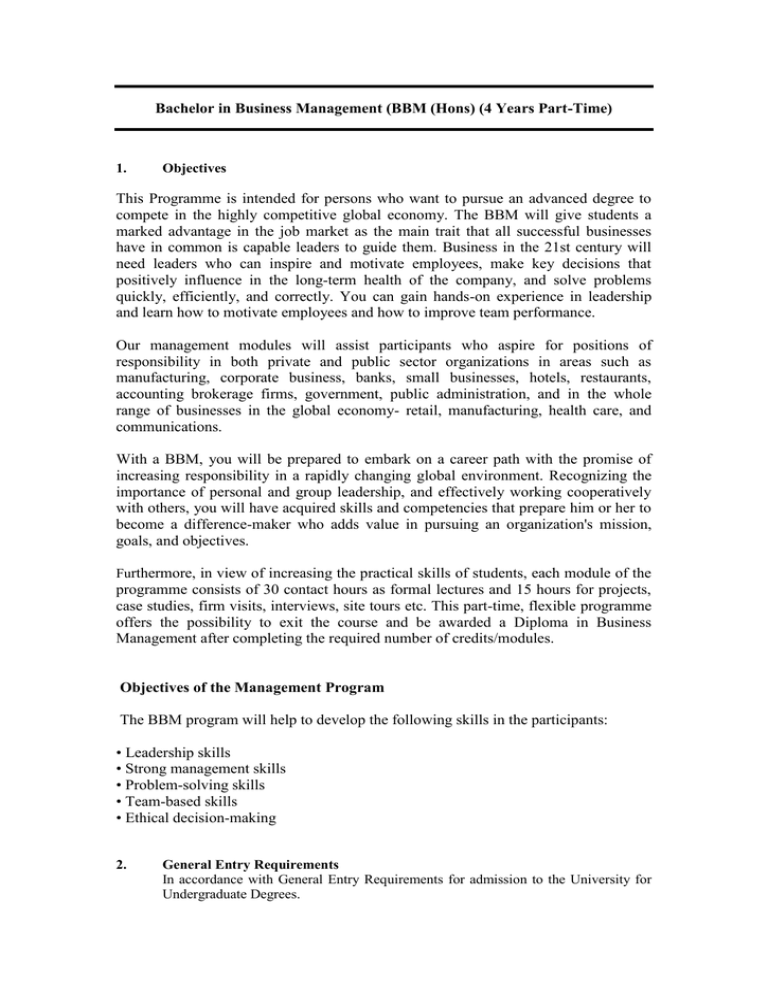
Bachelor in Business Management (BBM (Hons) (4 Years Part-Time) 1. Objectives This Programme is intended for persons who want to pursue an advanced degree to compete in the highly competitive global economy. The BBM will give students a marked advantage in the job market as the main trait that all successful businesses have in common is capable leaders to guide them. Business in the 21st century will need leaders who can inspire and motivate employees, make key decisions that positively influence in the long-term health of the company, and solve problems quickly, efficiently, and correctly. You can gain hands-on experience in leadership and learn how to motivate employees and how to improve team performance. Our management modules will assist participants who aspire for positions of responsibility in both private and public sector organizations in areas such as manufacturing, corporate business, banks, small businesses, hotels, restaurants, accounting brokerage firms, government, public administration, and in the whole range of businesses in the global economy- retail, manufacturing, health care, and communications. With a BBM, you will be prepared to embark on a career path with the promise of increasing responsibility in a rapidly changing global environment. Recognizing the importance of personal and group leadership, and effectively working cooperatively with others, you will have acquired skills and competencies that prepare him or her to become a difference-maker who adds value in pursuing an organization's mission, goals, and objectives. Furthermore, in view of increasing the practical skills of students, each module of the programme consists of 30 contact hours as formal lectures and 15 hours for projects, case studies, firm visits, interviews, site tours etc. This part-time, flexible programme offers the possibility to exit the course and be awarded a Diploma in Business Management after completing the required number of credits/modules. Objectives of the Management Program The BBM program will help to develop the following skills in the participants: • Leadership skills • Strong management skills • Problem-solving skills • Team-based skills • Ethical decision-making 2. General Entry Requirements In accordance with General Entry Requirements for admission to the University for Undergraduate Degrees. 3. Programme Requirements Credit in five (5) subjects at ‘O’ Level including Mathematics. 2 GCE ‘A’ Level passes. (Suitable candidates may be called for an interview) Students who have a Diploma in Management or related field from the University of Mauritius or a Recognised Institution can also apply for admission, with relevant exemptions, to this programme. 4. Programme Duration Diploma: Degree: 5. Normal (Year(s)) 2 4 Maximum (Years) 5 7 Credits per Year Minimum 9, Maximum 24 subject to Regulation 4. 6. Minimum Credits Certificate: Diploma: Degree: Required for Award of 39 69 102 Note: Certificate/Diploma/Degree will be delivered on EXIT of Programme, after having completed the above number of credits. 7. Assessment Each module will carry 100 marks and will be assessed as follows (unless otherwise specified): Assessment will be based on a written examination of 2-hour or 3-hour duration as specified and continuous assessment carrying a range of 10% to 30% of total marks. Continuous assessment may be based on mini-projects, assignments, and/or class tests. For a student to pass a module, a minimum of 30% should be attained in both of Continuous Assessment and Written Examination separately, with an overall total of a minimum of 40% in that module. 8. Mode of Delivery Modules of the programme will normally consist of 30 contact hours as formal lectures and 15 hours for projects, case studies, firm visits, interviews, site tours etc. Lecturers will be responsible to monitor the progress of students during those 15 hours to ensure that students satisfactorily meet the objectives and experiences set. Also, a report has to be submitted to lecturers for the latter to provide feedback on the work done. The report may be used for continuous assessment. 2 9. List of Modules CORE MODULES Module Code Module Name MIBS 32311 MIBS 20111 MIBS 72311 MIBS 50111 MIBS 10111Y MIBS 12400 MIBS 11412 MIBS 11712 MIBS 40111 MIBS 11121Y MIBS 31212 MIBS 17321 MIBS 52212 MIBS 12721Y MIBS 61322 Accounting for Management Introduction to Finance Business Environment Introduction to Law Principles of Management II Introduction to Marketing Organisational Behaviour Business Communication IT Applications Human Resource Management Financial Accounting Business Statistics Business Legal Framework Marketing Management Entrepreneurship and Small Business Management Business Research Methods Customer Relationship Management Employee Relations Production Management Corporate Governance and Ethics Management Information System (MIS) Corporate Finance Business Policy and Strategy Quality and Innovation Management Strategic Marketing Management Management Project-Action Learning International Business Human Capital Management MIBS 19122 MIBS 12831 MIBS 11231 MIBS 14331 MIBS 18532 MIBS 13132 MIBS 10632 MIBS 17141 MIBS 15341 MIBS 15541 MIBS 19941Y MIBS 17442 MIBS 12042 Hrs/Wk L+P 2+1 2+1 2+1 2+1 2+1 2+1 2+1 2+1 2+1 2+1 2+1 2+1 2+1 2+1 2+1 Credits 2+1 2+1 2+1 2+1 2+1 2+1 2+1 2+1 2+1 2+1 1+2 2+1 2+1 3 3 3 3 3 3 3 3 3 3 6 3 3 2+1 2+1 2+1 2+1 3 3 3 3 3 3 3 3 6 3 3 3 3 6 3 3 3 6 3 ELECTIVE MODULES MIBS 10431 MIBS12731 MIBS 12932 MIBS 11132 Managing Knowledge Marketing of services International Marketing Human Resource Development 3 10. Programme Plan – BBM (Hons) (Part-time) SEMESTER 1 Module Code Module Name CORE MIBS 32311 MIBS 20111 MIBS 72311 MIBS 50111 MIBS 10111Y Accounting for Management Introduction to Finance Business Environment Introduction to Law Principles of Management I Hrs/Wk L+P Credits 2+1 2+1 2+1 2+1 2+1 3 3 3 3 - Hrs/Wk L+P Credits 2+1 2+1 2+1 2+1 2+1 6 3 3 3 3 SEMESTER 2 Module Code Module Name CORE MIBS 10111Y MIBS 12400 MIBS 11412 MIBS 11712 MIBS 40111 Principles of Management Introduction to Marketing Organisational Behaviour Business Communication IT Applications SEMESTER 3 Module Code Module Name MIBS 11121Y MIBS 31212 MIBS 17321 MIBS 52212 MIBS 12721Y Human Resource Management Financial Accounting Business Statistics Business Legal Framework Marketing Management Hrs/Wk L+P 2+1 2+1 2+1 2+1 2+1 Credits Hrs/Wk L+P Credits 2+1 2+1 2+1 6 6 3 2+1 3 3 3 3 - SEMESTER 4 Module Code CORE MIBS 11121Y MIBS 12721Y MIBS 61322 MIBS 19122 Module Name Human Resource Management Marketing Management Entrepreneurship and Small Business Management Business Research Methods 4 SEMESTER 5 Module Code Module Name Hrs/Wk L+P Credits CORE MIBS 12831 MIBS 11231 Customer Relationship Management Employee Relations 2+1 2+1 3 3 MIBS 14331 Electives MIBS 10431 MIBS12731 Production Management Choose One from: Managing Knowledge Marketing of services 2+1 3 2+1 2+1 3 3 Hrs/Wk L+P Credits SEMESTER 6 Module Code Module Name CORE MIBS 18532 Corporate Governance and Ethics 2+1 3 MIBS 13132 MIBS 10632 Electives MIBS 12932 MIBS 11132 Management Information System (MIS) Corporate Finance Choose one from International Marketing Human Resource Development 2+1 2+1 3 3 2+1 2+1 3 3 SEMESTER 7 Module Code Module Name CORE MIBS 19941Y MIBS 17141 MIBS 15341 MIBS 15541 Management Project- Action Learning Business Policy and Strategy Quality and Innovation Management Strategic Marketing Management Hrs/Wk L+P Credits 1+2 2+1 2+1 2+1 3 3 3 Hrs/Wk L+P Credits 1+2 2+1 2+1 6 3 3 SEMESTER 8 Module Code Module Name CORE MIBS 19941Y MIBS 17442 MIBS 12042 Management Project-Action Learning International Business Human Capital Management Note 1: Electives are subject to: (i) Availability of resources & (ii) minimum critical mass of students for the elective 5 Total Number of Modules: (excluding Management project and research methods) Semester Core (Credits) Electives (Credits) 1 2 3 4 5 6 7 8 TOTAL 12 18 9 18 9 9 9 6 90 3 3 6 6 Management Project/Action Learning (Credits) 6 6 Total Credits 12 18 9 18 12 12 9 12 102 Bachelor in Business Management (BBM (Hons) (Part-Time) 11. OUTLINE SYLLABUS MIBS 32311 Accounting for Management The Basic Accounting Framework; Recording and Analysing Transactions; Accounting Concepts and Practice; Final Accounts; Provisions and Depreciation; Capital and Revenue Expenditure; Bank Reconciliation Statement; Accounting Ratios; Accounting for Internal Decision Making; Elements of Costs; Introduction to Budgeting. MIBS 20111 Introduction to Finance The Financial System; Capital Markets; Time value of money; Capital Budgeting: an introduction; Valuation of Financial Assets; Bond Analysis: an introduction; Risk, Return and Diversification; Efficient Market Hypothesis; Multinational Finance: an introduction. MIBS 10211 Business Environment Economics and the business environment markets; demand and supply; pricing and output decisions in imperfect markets; cost of production; government, the firm and the market; macroeconomic environment: economic systems, national income flows and measures, macroeconomic objectives, and macroeconomic policies; the global business environment; multinational corporations and business strategy; market failures. MIBS 50111 Introduction to Law Law as a normative system. Sources of law. Legislation and the legislative process. Statutory interpretation. Droits subjectifs and legal personality; Aspects of SMIBStantive Mauritian Law; The Judicial Process, Introduction to Labour Laws. MIBS 10111Y Principles of Management Definition, functions, process, scope and significance of Management. Nature of management, Managerial roles, managerial skills and activities. Difference between management and Administration. Significance of values and ethics in Management. Evolution of management, Functions of management. Planning and organization nature, objectives and significance of planning, element and steps of planning. Decision making organizing principles, Span of control. Line and staff relationship. Authority, delegation and decentralization. Effective organizing, organizational structures. Formal and informal organizations. Staffing. Directing: Effective directing, supervision, motivation. Different theories of motivation- Job satisfaction, Concepts of leadership-Theories and styles. Communication process, Channels and barriers, Effective communication. 7 Controlling and coordination-Elements of managerial control, Control systems, Management control techniques, Effective control systems, Coordination concepts, Importance, Principles and techniques of coordination, Concepts of Managerial Effectiveness MIBS 12400 Introduction to Marketing Origins of Marketing; Business & Marketing Strategy, Defining the Customer Need; Segmentation, and Value Proposition; Competitive Landscape; The Marketing Mix; Products/Services creation; Pricing Decisions; Communication Strategies; Salesforce & Distribution Channel; High-Potential Ventures MIBS 11412 Organisational Behaviour Organization and its Analysis, Individual Dimensions of Organizational Behaviour: Nature of Human Behaviour Perception, Learning and Behaviour Modification. Personality, attitudes, Motivation, Socio-cultural Factors and Behaviour Dynamics of Groups. Interactive Dimension of Organizational Behaviour: International Behaviour, Group Dynamics and Behaviour, Power, Authority, and Politics, Leadership, Communication, Organizational conflicts, Organizational Climate. Structural Dimensions of Organizational Behaviour: Organization Theory. Determinates of Organizational Effectiveness and change: Organizational effectiveness, Organizational change, and Development. Major Forces of change, Types of change, Reaction to Change, Developing Support for change MIBS 11712 Business Communication Basic forms of communication, communication Self- development and communication: Developing positive personal attitude. Corporate communication: Formal and informal communication networks, grapevine, communication barriers, improving communication, Principles of effective communications (giving and receiving feedback), Managing meetings, Time Management, Writing Skills: Planning business messages, Rewriting editing, the first draft, reconstructing the final draft, Business letters and memo formats and appearances, Report Writing: Introduction to proposals, short reports and formal reports, Effective Listening: Principles of effective listening, factors affecting listening, listening exercise- oral, written and video sessions, Presentation skills and assertiveness. MIBS 40111 IT Applications IT and Computers; Stepping in the Computer; Input and Output Devices; Secondary Storage; Programming; Systems Software; Applications Software; Systems Development; Computer Networks; The Internet; Computer Security; Software Utilities; Issues and Trends in IT. 8 MIBS 11121Y Human Resource Management Human Resource Management: An Introduction and evolution, HR Functions/roles and goals, differences with Personnel Management; Organisational citizenship behaviour and organisational culture, Psychological contracts, Organisational justice; Organisational Structure, Job Characteristics model and work design; Employee resourcing - Human Resource Planning and labour market, Job Analysis, Job Description and Evaluation, Recruitment and Selection process; Human resource development - Training, Development and Growth, Performance management; Employee relations – Reward management, concepts, mechanisms and practices in employee relations, partnership, building a great place to work. Strategic human resource management- HRM and organizational performance; International human resource management – management of expatriates, cross cultural management; Virtual organization and remote management; eHR (Shared services, HR outsourcing, call centre management, web based HR); Comparative human resource management (US, EU, Japan, Asia-Pacific, etc.), Public sector HR (New public management), Criticisms of HRM, Case Study and seminars. MIBS 31212 Financial Accounting Depreciation; Correction of Errors; Control Accounts; Value Added Tax; Stock Valuation Methods;Partnerships; Goodwill and Changes in Partnerships; Incomplete Records; Accounting for Not-for- Profit Organisations; Limited Companies; Business Purchase; Accounting Standards & Desirable Attributes of Accounting Information; Cash Flow Statement; Interpretation of Financial Statements. MIBS 17321 Business Statistics Classification & presentation of data including diagrammatic presentation. Measures of central tendency – Mean, Mode, Medium, Arithmetic, Geometric & Harmonic Mean. Measures of Dispersion Range, Quartile Deviation, Average & standard deviation. Types of sampling, size of sample.,Probability theory including Baysian probability, probability distributions and their characteristicsl, confidence intervals. Sample bivariate, correlation & regression. ,partial & multivariate correlation & regression.,Index numbers – aggregative & average of price relative methods. Time series analysis – trend analysis using moving average & regression analysis MIBS 52212 Business Legal Framework The regulatory framework (Financial Services Development Act and other legislation); Law relating to e-Business and e-banking; The legal dimensions of insurance relationships; The legal framework of banking transactions (banking services, the bank-client relationship, securities in banking transactions); The legal aspects of the financing of international transactions; Securities Regulation; Money laundering. 9 MIBS 12721Y Marketing Management Nature, Scope and Importance of Marketing, Modern marketing Concepts, Marketing Mix and Marketing Environment. Meaning and Dimensions of Market, Market segmentation. Consumer Behaviour; Meaning and Its Importance, consumer Buying Behaviour, Determinants of Consumer Behaviour, Product: Meaning, Role, Product Planning and process, Product Life Cycle, Product- Market Integration, Productpositioning, Branding, Packaging. Pricing Advertising and Channels of Distribution: Pricing-Meaning, Role, Theory and Practice of Pricing Management. Advertising - Meaning, Role, Profile of advertising in India, Management of advertising, Channel of Distribution Meaning, Role, Classification, Factors Governing Choice of Channels and Intermediaries. Physical Distribution, Market Organization, Physical Distribution, Meaning, Objective, Organization, Role and Relevance of Physical Distribution, Physical distribution Management, Marketing Organization: Organization for Marketing Evaluation of Marketing Organization, Principle of Organization Design, Organizational problems. An Overview of Global Marketing, Services Marketing, Marketing Challenges in 21st Century. MIBS 61322 Entrepreneurship and Small Business Management Definition of Entrepreneurship, Characteristics of Entrepreneur, Concept of Entrepreneurship-Conceptual model. views of schumpeter, walker And Drucker, Entrepreneurship Culture, Traits of a true Entrepreneur, difference between Entrepreneur and Manager, entrepreneurial Motivation-Motivation Factors. Motivation Theory. Definition of Small Business, The Benefits and Opportunities of small Business Ownership, Ownership Structure and Organizational Frame work, Sole Proprietorship. Partnership, Corporations, Advantages and Disadvantages, Evaluation the existing Business, The Potential Drawbacks of Entrepreneurship, forms of Ownership. Problems Related to Financial Management, Operational Management and Marketing Management in Small Scale Enterprises. MIBS 19122 Business Research Methods . Research- Introduction, Definition, Importance, scope and Limitations of Market Research, Objectives, Types of Research planning and Designing Research. secondary and Primary Data Collection- Introduction to Secondary Data Source and their Types, Methods of Data Collection, Data Preparation-Validation, Editing, Coding Tabulation and Cross Tabulation of Data, Data Analysis and Interpretation, Hypothesis Testing, Univariate and Bivariate Data Analysis, Multivariate Data Analysis. Sampling and Questionnaire Design and Construction-Introduction to Sampling, Sampling Process, Sampling Designs, Sample Size, Application of Sampling, Steps involved in Questionnaire Construction, Questionnaire Designs, Attitude Measurement, Use of computer packages-SPSS 10 MIBS 12831 Customer Relationship Management Conceptual Frame Work of Customer Relationship and Its Management. Evolution Customer Relationship Marketing, Types of CRM-Win Back, Prospecting, Loyalty, Cross Sell And Up Sell, Significance and Importance of CRM In Modern Business Environment. Introduction CRM-Planning, Strategy for CRM, Process of Segmentation, Choice of Technology, Choice of Organizational Structure For CRM, Understanding Market Intelligent Enterprises. Implementation of CRM: Business Oriented Solutions, Project Management, Channel Management , CRM In Services, CRM In Financial Services, Use of E-Commerce In CRM,CRM and Data Mining, Information Required for Effective CRM. Concept of Loyalty In CRM: Definition Of Loyalty, Customer Loyalty And Customer Dependency, Process Of Developing Customer Loyalty. MIBS 11231 Employee Relations Introduction to Work Relations, Evolution and Historical Background, Industrial relations: concept and significance of Industrial Relations, Trade Unions, Concept, Objectives and functions of Trade Unions, Environmental Factors, Role of Employers Federations, Role of State, Collective Bargaining (Role of Trade Unions in Collective Bargaining, CB Procedures, Collective Agreements, Negotiation), Arbitration, Mediation, Legal Framework (Labour Laws, IR Cases, Simulations), Conflicts and Strikes (Industrial Conflicts and resolutions), Dispute Resolution and Grievance settlement, Employee Discipline Regulatory Mechanism, Suspension, Dismissal, Retrenchment, Patterns of employment, Participation and Involvement of Employees, Discipline, Grievances, Health and Safety. Wage and salary Administration: Wage policy, Concept and Remuneration, Factors affecting Wages and Wage Fixing Machinery, MIBS 14331 Production Management Nature and Scope of Production management, Production Analysis and planning, Production Functions, Responsibilities of the Production Manager, Plant Location and layout, Production Planning And control, Procedure, Objectives And Importance of Production Planning And Production Control, Manufacturing systems, Materials Management-its scope And Importance, Purchasing Functions and Procedures, Store Keeping, Productivity-Concept And factors on Which Productivity depends, Measurement of Productivity, Input Output Analysis and Productivity, Product Development and Designing, stages of New Product Development, Standardization, Simplification and specialization, Automation. Development of efficiency Work Method, Method, Material Flow Process Chart, Manflow Process Chart, Principles of Motion Economy, Comparison of Alternative Work Methods, Safety and health considerations, Maintenance of Production Facilities, Quality Control and Inspection. Sampling Inspection, Quality Control Charts, Attributes and Variables Charts. 11 MIBS 10431 Managing Knowledge Evolution of knowledge management, reasons and benefits of managing knowledge, Models and approaches, Business Strategy - Resource based view, Intellectual capital, BSC and KM metrics; Strategy for Managing Knowledge – codification and personalisation; KM Process and Activities – generate, organise, develop and distribute, community of practice; Building a sharing culture – overcoming cultural barriers to sharing knowledge, Role and management of HR in implementing KM, Organisational unit, Roles and responsibilities; Enabling Technologies – connect, create and collaborate, contextualise; Managing Knowledge in practice – steps to making KM a reality, Seminars. MIBS 12731 Marketing of Services The Nature of Services Marketing-Introduction, Definition and Characteristics of Services, Classification of Services, Evolution of Services marketing, Importance of Services Marking in Indian Economy. The Services Marketing Mix-Importance of 7 Ps in Services Marketing. The Services Marketing- The People Component, Services and the Importance of the People Component, Using People to Differentiate Services, Internal Marketing, Employee Motivation and Implication for Service Delivery. Market Segmentation, Selection Of Market And Positioning Of Services, Quantity and Quality Of Services, Determinants Of Quality and Quantity. Application of the Components of Marketing of services in Financial services Hospitals, Consultancy Services, Education and Training Services., Tourism, Travel and transport Services. MIBS 18532 Corporate Governance and Ethics The Regulatory Framework, Companies Act, Listing Rules, Accounting Standards; Accounting Issues in Financial Reports; Recognition and measurement; Role and responsibilities of Board of Directors; Role and responsibilities of Management, Internal Auditor and External Auditor; Users of Financial reports and their expectation; Risk management and internal control; Financial Accounting Theory and the need for regulation; Integrated sustainability reporting; Business ethics and Social duty of Business. MIBS 13132 Management Information Systems Definition of Information Systems; Management levels as a Framework for Information systems; Information System Planning Strategies and Methods; Business Systems Planning (BSP), Critical Success Factors (CSF), Ends/Means (E/M) Analysis. Systems Concepts; System Concepts in Business; Information System as a system. Definition of Management Information System-Its Elements, Objectives, Structure; Making MIS Efficient and Effective, Limitations of MIS. System Development Life Cycle : Problem Definition, Feasibility Study, Systems Analysis, System Design, Implementation and Maintenance. 12 Overview of (i) computer Hardware, (ii) Computer Software (iii) file and Database Management Systems (iv) Computer Communications(v) Internet and Intranet. Actual Use And Practical of Application of Various Programmes In Computer Lab. MIBS 10632 Corporate Finance Investment Decisions (Capital Budgeting) Taxes and Investment Decisions ,Inflation and Investment Decisions ,Uncertainty and Investment Decisions ,Management of Short Term Assets and Debt ,Financing Decisions, Cash Budgeting MIBS 12932 International Marketing Introduction to International Marketing : Basic Concept and the Environment, Difference between Domestic Marketing and International Marketing, Scanning of International Marketing Environment, Scope and Size of International Marketing. International Marketing Selection and Segmentation, entry options and Strategies, International Marketing Planning, Coordination and Control. International Product Policy and Planning, Product Development, Product Life Cycle. International Pricing Policy, Pricing Objectives, Determination Pricing Policy and Pricing Strategy. International Distribution Channels, Selection and Management of Distribution Channels, International Promotion. Marketing Communication, Developing Promotional Mix for Foreign Markets MIBS 11132 Human Resource Development HRM and HRD, Strategic HRD, Learning Organisation, Workplace learning, Learning: Andragogy, Experiential learning, Learning to Learn; Training process, Training transfer and learning transfer system inventory; Performance management, 360 degree feedback, Coaching; Managing careers, Mentoring; Management development, Leadership development; Organisational change and HRD; Roles of HRD practitioners, Actors in HRD process; National HRD models; Seminars. MIBS 17141 Business Policy and Strategy Introduction to Business Policy and Strategic Management, Nature, Meaning and Scope, Importance Business Policy and Strategic Management, Corporate strategy, Business Strategy, Functional strategy. Corporate Planning, Concept of Planning, Planning Process, Types of Planning, Strategic Planning, Strategic Decision Making, Mission, Objectives and Goals. Major Strategic Options- stability Strategy, Growth or Expansion Strategy, Diversification Strategy, Retrenchment Strategy and Its Variations, Combination strategy, Turnaround Strategy, External Growth Strategy, Factors Influencing Choice of Strategy. Implementation of Strategy-Strategy and Organizational Structure, Different types of Organizational Structure, Organizational Resource Allocation, Developing Functional Strategies. 13 Strategy Evaluation and Strategic Controls, An Overview of Strategic Evaluation and Control, Strategic Control. MIBS 15341 Quality and Innovation Management Quality management concepts, tools and techniques, models and definitions of quality, function of process improvement teams, techniques for identification of problem areas and root cause analysis, statistical process methodologies, and organization action planning for measurable improvement, relationship between efficiency, process improvement, and cost savings, Quality Management systems and tools. Overview of innovation management: the importance of systematic innovation, developing an innovation strategy, dynamic interactions and innovation networks, technology transfer in innovation MIBS 15541 Strategic Marketing Management Concepts and elements of strategic marketing; Market oriented organisations; Situation analysis, understanding the marketing environment, customers and competitors; Financial analysis and forecasting techniques; Strategic tools (BCG, Ansoff Matrix, etc.); Segmentation, targeting and positioning strategies; Portfolio analysis; Brand Management strategies (global marketing management concepts); Supply chain management; Pricing strategies; Integrated Marketing Communications; Strategy implementation and control. MIBS 17442 International Business (All Overview of International Business, International Business Approaches, Global Marketing Theory of Competitive Advantages,International Business decision: Mode of Entry, Marketing Mix, Factors Affecting Decision For International Business, Role of International Institutions Like GATT, WTO, ECM, IMF, IBRD, IDA, IFC, UNCTAD, In International Business, Recent Trends in World trade, Multi National Corporations and the Trade. International Marketing Mix, Product Development, Transfer Logistics and Distribution Channels, Role of Documentation in International trade, Export Pricing, Methods of International Payments. Capital Movement, Risk in International Operations, International Investment, Financing of Foreign trade, Factor Mobility and Direct Foreign Investment. Export Finance, Regional Economic Groupings, Major Trading Blocks, Globalization with social responsibility, Introduction to International Monetary and Financial System MIBS 12042 Human Capital Management Strategic human resource management – strategic alignment, resource based strategy, matching model, high performance working, high commitment and high involvement management; Leadership and knowledge management; High performance and resultsoriented culture; Talent management – recruitment and retention; Accountability – balanced scorecard, HR scorecard, Measuring intangible assets, return on human capital investment. 14 MIBS 19942 Management Project - Action Learning Objectives The final project is supposed to represent a further specialisation based on a problem from a private or public business or a relevant theoretical field of study. Course details The management project will represent the work of a group of up to 4 students. The group is required to develop a project plan (preproject) that includes a formulation of the problem and a description of the project's objectives/aims, conceptual framework, and time requirements. The department will provide a group tutor. The students are required to submit regular status reports to their tutor. Action Learning (Reg Revans) L Total potential managerial learning process = P + Programmed Knowledge Q Pursuit of unresolved questions and problems 'Action Learning is based on the relationship between reflection and action ... where the focus is on the issues and problems that individuals bring and planning future action with the structured attention and support of the group. Put simply, it is about solving problems and getting things done' (Fry et al.). A major advantage of action learning is that participants will be able to look at the real problems which concern them, rather than considering hypothetical ones, and they will be responsible, together with an organisation, for the selection of the topic(s) / problem(s) discussed. An action learning set is a group of usually 4 - 7 people/groups who get together (on a regular basis) to discuss issues of personal or mutual importance. They are designed to deal with the specific needs of the set members and require agreed action by the end of each meeting. Sets may, or may not, be facilitated, or may start with a facilitator and later become self-facilitating. Whichever the case, some ground rules will be negotiated at the outset. The facilitator will help to develop the ground rules for the operation of the set. This will include allocation of time, confidentiality, attendance, etc. Action Learning Sets can enable participants to make commitments to action which they would not necessarily be in a position to do after having listened to a lecture or seminar, or as an individual working in isolation. There are usually three stages: identifying and clarifying the problem; listing possible actions; and selecting which specific action to take. Participants (individuals or in groups) will work together on their chosen topics, listening and supporting their colleagues, and helping them to decide on courses of action. Participants will help individuals to understand the problem better and to challenge their underlying assumptions, rather than to offer advice. Participants will be invited in turn to share their problem. Their peers will look at the problem from 15 their own perspective, and through pertinent questions, discussion and sharing of experience, participants will be helped to move on in their understanding of an issue or problem, and to come to see possible ways forward. Participants will be encouraged to show empathy rather than be judgemental, to listen and provide support for each other. Assessment Detailed guidelines, deadlines and assessment criteria will be provided at the beginning of the project. A portfolio of work (comprising of documentation of the work in progress and a final report of 5000-6000 words) as well as final oral presentation will be the basis for assessment in this module. Members of the project group can be assigned different grades based on their contribution in the overall work following peer and tutor/set facilitator appraisal. 16
